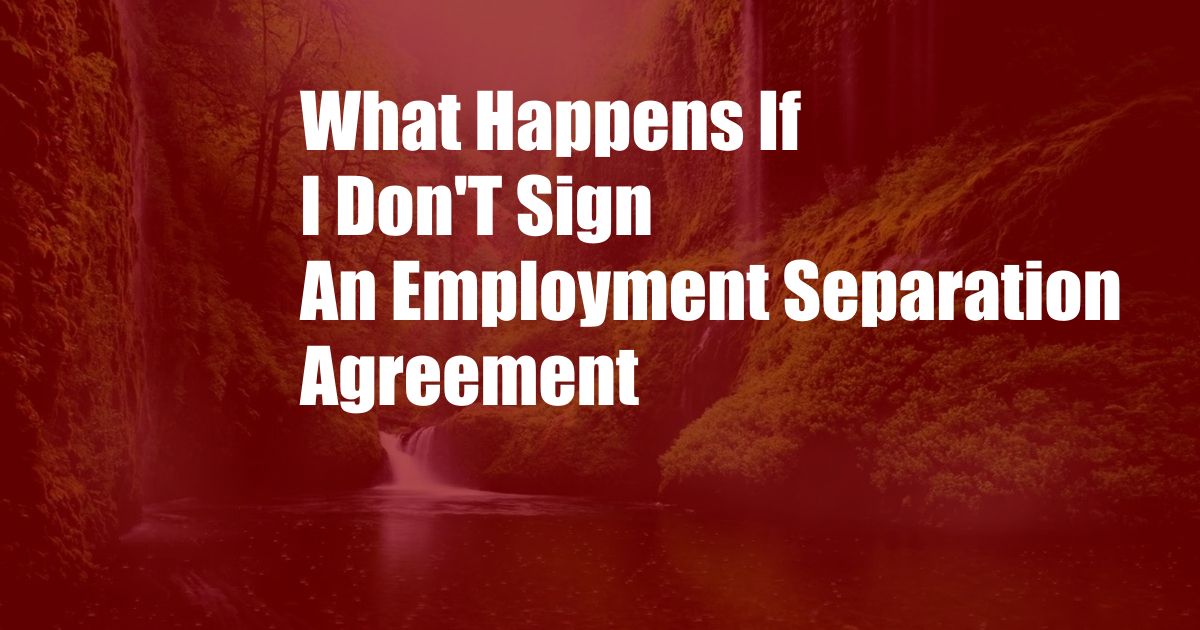
What Happens If I Don’t Sign an Employment Separation Agreement?
Separating from a workplace can be an emotionally charged experience. Often, employers offer severance packages with separation agreements. These agreements are legal documents that outline the terms of separation, including severance pay, benefits, and non-compete clauses.
While signing a separation agreement can provide some peace of mind, it’s important to understand the potential consequences of declining to sign. This article delves into the implications of not signing an employment separation agreement, providing a comprehensive overview of the topic.
Legal Implications of Not Signing
A separation agreement serves as a binding contract between the employer and the departing employee. By signing, both parties acknowledge and accept the terms of the separation, including the release of claims against each other. Refusing to sign nullifies this contractual effect, leaving both parties vulnerable to legal recourse.
If an employee does not sign a separation agreement, they retain the right to pursue legal action against the employer for any perceived grievances or disputes arising from the employment relationship. Similarly, the employer reserves the right to take legal action against the employee for potential breaches of the separation agreement, such as violating non-compete or non-disclosure clauses.
Financial Implications
Separation agreements often include financial provisions, such as severance pay, benefits continuation, and stock options. By declining to sign, an employee may forfeit these benefits, potentially resulting in a significant financial loss.
Additionally, if an employee later decides to pursue legal action against their former employer, they may be required to repay any severance or benefits received. This can lead to unexpected financial hardships and complications.
Impact on Future Employment
Separation agreements can also contain non-compete and non-disclosure clauses. These clauses restrict the employee’s ability to work for competing companies or disclose confidential information. By refusing to sign, an employee may limit their future employment opportunities and hinder their ability to move into related fields.
Furthermore, a negative separation can impact an employee’s professional reputation and make it more challenging to secure future employment. Employers may view a refusal to sign as a sign of dissatisfaction or conflict, potentially raising red flags during the hiring process.
Tips and Expert Advice
To make an informed decision about signing a separation agreement, consider these tips and expert advice:
- Seek Legal Counsel: An attorney can review the agreement and provide guidance on your legal rights and obligations.
- Negotiate Terms: If you have concerns about specific terms in the agreement, attempt to negotiate with your employer to modify them.
- Don’t Sign Under Duress: Ensure you have ample time to review and understand the agreement before signing. Avoid signing under pressure or coercion.
FAQs
Q: Can I decline to sign a separation agreement and still receive severance pay?
A: No, declining to sign typically means forfeiting any severance or benefits outlined in the agreement.
Q: What are the risks of not signing a separation agreement?
A: Declining to sign exposes both parties to potential legal risks, financial penalties, and limits on future employment opportunities.
Q: If I change my mind, can I later sign the separation agreement?
A: Typically, once you decline to sign, you cannot later change your mind and sign it.
Conclusion
Deciding whether to sign an employment separation agreement is a significant decision with potential legal, financial, and career implications. By understanding the consequences of not signing, you can make an informed choice that protects your rights and interests. If you have any doubts or concerns about the agreement, seek legal advice to ensure you have a clear understanding of your options.
Are you curious to learn more about this topic or have additional questions? Let us know, and we’ll be happy to provide further insights.